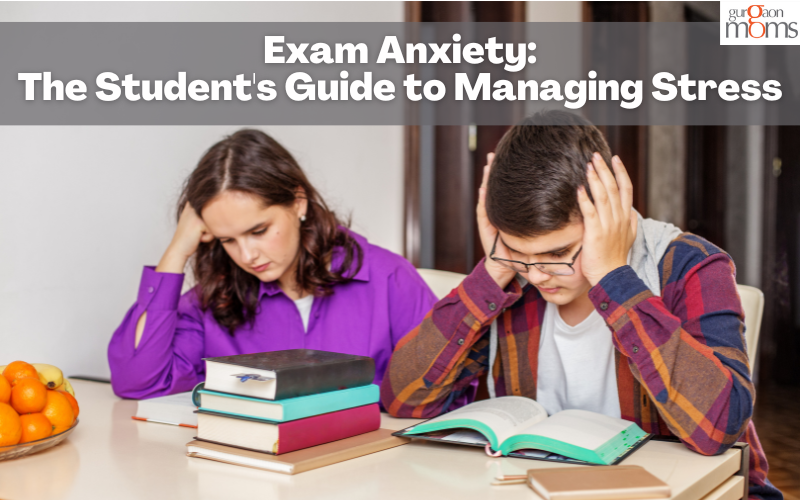Have you ever found yourself familiar with that sinking feeling right before an exam? The nervousness, stress, and jittery anticipation many of us have experienced at some point? It’s entirely normal to feel stress and nervousness when exams are approaching—it’s a shared sentiment among students. However, the concern arises when these feelings intensify and persist, reaching a point where they affect your academic performance and mental health. This is called exam anxiety, also known as test anxiety.
In this blog, we will understand when exam fear becomes more than a momentary challenge. Exam anxiety, when experienced intensely over an extended period, can significantly impact your ability to perform well academically. Let’s explore this further and, more importantly, discuss strategies to navigate and overcome the challenges associated with persistent exam stress. You’re not alone in this journey, and effective ways exist to manage and ease these pressures.
Understanding Exam Anxiety
Exam anxiety or Test anxiety is a challenge that manifests in various emotional, physical, cognitive, and behavioural symptoms. Recognising these exam anxiety symptoms is crucial for understanding and addressing this issue that many individuals encounter before, during, and after exams.
Common Exam Anxiety Symptoms
Physical Symptoms:
- Increased Heart Rate: A heightened heartbeat is a prevalent physical symptom, reflecting the physiological response to anxiety.
- Muscle Tension: Tensed muscles throughout the body, often in the neck and shoulders, indicate the physical strain associated with exam anxiety.
- Nausea and Digestive Changes: Upset stomach, nausea, or changes in digestion are common physical manifestations.
- Fatigue without Physical Exertion: Feeling tired without engaging in physical activity is a notable symptom of exam-related stress.
- Increased Sweating: Profuse sweating, particularly in the palms, is a common response to heightened anxiety.
- Difficulty Breathing or Chest Tightness: Shortness of breath or a sensation of tightness in the chest can indicate heightened stress levels.
- Changes in Sleep Pattern: Disrupted sleep patterns, either excessive sleeping or insomnia, are frequent occurrences.
2. Psychological Symptoms:
- Excessive Worry: Continuous, intrusive thoughts about the exam, potential outcomes, or fear of failure.
- Difficulty Concentrating: A challenge in focusing on study materials due to racing thoughts.
- Irritability: Increased irritability and sensitivity to external stimuli.
- Negative Self-Talk: Engaging in self-critical thoughts and doubting one’s capabilities.
- Panic Attacks: Intense, sudden episodes of fear or panic may occur.
- Feeling Down or Helpless: A general sense of despair or helplessness may accompany exam-related stress.
- Sense of Shame or Guilt: Unwarranted feelings of shame or guilt can be psychologically distressing.
Impact on Academic Performance
Exam anxiety can have substantial consequences on academic performance, including:
- Impaired Memory: Difficulty recalling information due to heightened stress during the exam.
- Reduced Cognitive Function: Impaired ability to think clearly and solve problems effectively.
- Poor Time Management: May lead to difficulty managing time during the exam.
- Avoidance Behaviours: Students may avoid studying altogether to escape the anxiety, leading to inadequate preparation.
It is important to differentiate between typical exam fear and exam anxiety, as the latter can be more intense and prolonged. Normal exam stress may motivate you to prepare adequately, but exam anxiety may hinder your ability to perform well. Indicators of exam anxiety include persistent, excessive worry, physical symptoms that interfere with daily functioning, and a disproportionate fear of failure.
Causes of Exam Anxiety
Exam anxiety can arise from various factors, and understanding its causes is essential for effective management. Here are common causes of exam anxiety:
Fear of Failure
The fear of failure is a potent contributor to exam anxiety. The anticipation of disappointing oneself, family, or peers can create immense pressure. This fear often stems from a desire for success and the perceived consequences of falling short.
2.High Expectations
Experiencing heightened expectations, whether self-imposed or imposed by others, can fuel exam anxiety. The pressure to meet exceptionally high standards may lead to feelings of inadequacy and intensify the stress associated with academic assessments.
3. Lack of Preparation
Insufficient preparation is a common and understandable cause of exam anxiety. When individuals feel underprepared, the fear of not being able to recall information or perform well during the exam can lead to heightened stress levels.
4. Peer Pressure
Peer pressure, especially in academic settings, can contribute significantly to exam anxiety. The comparison with peers, concerns about meeting expectations, and the fear of judgment can create an environment where stress and anxiety thrive.
5. Test-Taking Environment
The surroundings in which exams are conducted can also be a source of anxiety. Factors such as a noisy environment, uncomfortable seating arrangements, or inadequate testing facilities may contribute to heightened stress levels during exams.
Tips on How to Cope with Exam Anxiety
Learning how to cope with exam anxiety is vital for optimal performance and overall well-being. Here are some effective tips to manage and relieve exam anxiety:
A. Preparation Strategies
Effective Study Techniques:
- Active Learning: Engage in activities that require active participation, such as summarizing information, teaching concepts to others, or creating flashcards.
- Practice with Past Papers: Familiarize yourself with the exam format and types of questions by practicing with previous years’ papers.
- Break Down Study Sessions: Divide your study sessions into manageable chunks, incorporating breaks to prevent burnout.
2.Time Management:
- Create a Schedule: Develop a realistic study schedule that allocates time for each subject or topic.
- Prioritise Tasks: Identify key areas to focus on and allocate more time to challenging subjects.
- Avoid Cramming: Steer clear of last-minute studying by spacing out your study sessions across multiple days; for instance, dedicating an hour each evening throughout the week enhances information retention and understanding.
B. Psychological Coping Mechanisms
Relaxation Techniques:
- Deep Breathing: Practise deep, diaphragmatic breathing to calm the nervous system.
- Progressive Muscle Relaxation: Systematically tense and then relax different muscle groups to alleviate physical tension.
- Mindfulness and Meditation:
- Incorporate mindful practices, such as guided meditation sessions, to stay present and reduce anxiety during exam preparation using apps like Headspace, Medito and Insight Timer.
- Grounding techniques that soothe the 5 sense organs can create a calming sensation. For instance, engage in activities like painting or touching the items around you (sense of touch), listen to calming nature sounds (sense of hearing), focus on the aroma of soothing essential oils (sense of smell), have a mindful snack with attention to taste and texture (sense of taste), and appreciate the soft glow of a candle or the texture of a stress-relief ball (sense of sight).
- These practices not only enhance concentration and cognitive function but also foster an overall sense of calm, cultivating a more effective and stress-free study experience.
- Visualise Success: Picture yourself confidently tackling the exam and succeeding.
- Create a Positive Affirmation: Develop a mantra or positive affirmation to boost confidence and combat negative thoughts. For instance, repeat statements like “I can do this” or “Every challenge is an opportunity for growth,” fostering a resilient and optimistic mindset throughout your exam preparation.
- Focus on Progress: Celebrate small achievements during your study sessions to maintain a positive mindset.
C. Lifestyle Adjustments
Adequate Sleep
- Establish a Sleep Routine: Create a consistent sleep schedule to ensure quality rest.
- Digital Detox: Minimize screen time at least 30 minutes before bedtime, as the blue light emitted from electronic devices can interfere with the natural sleep-wake cycle. Prolonged screen exposure, especially close to bedtime, hinders melatonin production (resulting in sleep disruption) and contributes to eyestrain, headaches, and difficulty focusing. Additionally, excessive screen time before sleep is linked to increased feelings of restlessness and may negatively impact the overall quality of your sleep.
- Power Naps: Take short, rejuvenating naps during the day as they offer numerous benefits for cognitive function and overall well-being. Timed strategically, preferably lasting between 10 to 20 minutes, power naps can enhance alertness, improve mood, and boost creativity. These brief breaks allow for a quick recharge without entering the deeper stages of the sleep cycle, preventing grogginess upon waking. It’s essential to time power naps strategically, aiming for mid-afternoon to avoid interference with nighttime sleep.
2.Healthy Diet and Exercise
- Balanced Nutrition: Maintain a well-balanced diet rich in nutrients to support overall health.
- Regular Exercise: Incorporate regular physical activity into your routine to reduce stress and boost energy levels.
- Hydration: Stay adequately hydrated, as dehydration can contribute to fatigue and cognitive decline.
D. Seeking Support
Talking to Peers or Mentors:
- Share Concerns: Discuss your worries with friends, classmates, or mentors to gain perspective and support.
- Form Study Groups: Collaborate with peers to share insights and resources, cultivating a sense of unity and fellowship.
2. Professional Counselling:
- Counselling Services: Seek guidance from a professional counsellor or therapist from renowned institutes like Sukoon Health to address deeper anxieties.
- Group Therapy Sessions: Participate in group therapy sessions, either in-person or online, to share experiences, gain insights, and build a sense of community support.
Summing it up
Exam anxiety is a common challenge with physical and psychological effects. Recognising its impact on academic performance emphasizes the importance of knowing how to reduce stress and anxiety during exams, from effective study techniques to seeking support. Seeking help is a courageous step toward overall well-being. Embracing change and adopting personalized coping mechanisms not only contributes to academic success but also promotes personal growth and resilience. You’re not alone in this journey, and by acknowledging your unique experience, implementing positive changes, and building a supportive environment, you can emerge stronger. Best of luck in your academic endeavors, and remember that your well-being is of utmost importance.
 This article has been authored by Aradhya Awasthi
This article has been authored by Aradhya Awasthi
Aradhya Awasthi is a licensed clinical Psychologist registered with the Rehabilitation Council of India with two years of clinical experience. She has specialized training in psychological assessments and psychotherapy and strongly emphasizes the importance of a therapeutic alliance between herself and her clients. Aradhya utilizes an eclectic approach in her practice and has particular interests in neurosis, neurodevelopmental, and de-addiction. She is dedicated to breaking existing stigmas surrounding mental health and creating awareness to promote a better quality of life for individuals









